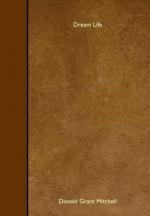A great many inquisitive people will, I do not doubt, be asking, after all this prelude, if my pictures are true pictures? The question—the courteous reader will allow me to say—is an impertinent one. It is but a shabby truth that wants an author’s affidavit to make it trustworthy. I shall not help my story by any such poor support. If there are not enough elements of truth, honesty, and nature in my pictures to make them believed, they shall have no oath of mine to bolster them up.
I have been a sufferer in this way before now; and a little book that I had the whim to publish a year since, has been set down by many as an arrant piece of imposture. Claiming sympathy as a Bachelor, I have been recklessly set down as a cold, undeserving man of family! My story of troubles and loves has been sneered at as the sheerest gammon.
But among this crowd of cold-blooded critics, it was pleasant to hear of one or two pursy old fellows who railed at me for winning the affections of a sweet Italian girl, and then leaving her to pine in discontent! Yet in the face of this, an old companion of mine in Rome, with whom I accidentally met the other day, wondered how on earth I could have made so tempting a story out of the matronly and black-haired spinster with whom I happened to be quartered in the Eternal City!
I shall leave my critics to settle such differences between themselves; and consider it far better to bear with slanders from both sides of the house, than to bewray the pretty tenderness of the pursy old gentlemen, or to cast a doubt upon the practical testimony of my quondam companion. Both give me high and judicious compliment,—all the more grateful because only half deserved. For I never yet was conscious—alas, that the confession should be forced from me!—of winning the heart of any maiden, whether native or Italian; and as for such delicacy of imagination as to work up a lovely damsel out of the withered remnant that forty odd years of Italian life can spare, I can assure my middle-aged friends, (and it may serve as a caveat,) I can lay no claim to it whatever.
The trouble has been, that those who have believed one passage, have discredited another; and those who have sympathized with me in trifles, have deserted me when affairs grew earnest. I have had sympathy enough with my married griefs, but when it came to the perplexing torments of my single life—not a weeper could I find!
I would suggest to those who intend to believe only half of my present book, that they exercise a little discretion in their choice. I am not fastidious in the matter, and only ask them to believe what counts most toward the goodness of humanity, and to discredit—if they will persist in it—only what tells badly for our common nature. The man, or the woman, who believes well, is apt to work well; and Faith is as much the key to happiness here, as it is the key to happiness hereafter.




